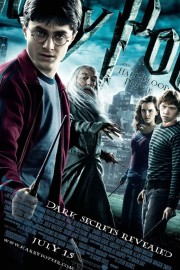Harry Potter and the Half-Blood Prince
As the credits began to roll on “Harry Potter and the Half-Blood Prince,” a friend of mine brought up “The Matrix Reloaded” in comparison to the sixth film based on J.K. Rowling’s fantasy series. It’s a valid comparison really- this film more sets up the final installment, the two-film adaptation of “Harry Potter and the Deathly Hallows” coming out in 2010 and 2011, than it does end as a pat cinematic work on its’ own…
…which is anything but bad if you ask me. This series had me from the first time Harry (Daniel Radcliffe, who’s been riveting and poignant to watch grow up onscreen in the role) caught a glimpse of the letter that he was destined to spend his adolescence at Hogwarts. Besides, like Peter Jackson’s “The Lord of the Rings” and George Lucas’ “Star Wars” saga (the live-action one, anyway), in the end, the series will be a cohesive, single work anyway split into chapters. How the individual films work on their own is less important than how they move the story forward.
“Half-Blood Prince,” however, takes things back in ways of surprising gravity and grace, as Dumbledore (Michael Gambon, who’s so at home in the role, brilliant even, that it was jarring to watch the more grandfatherly Richard Harris play him in “Sorcerer’s Stone” recently) prepares Harry for what is to come. With Voldemort on the loose, and his Death Eaters gathering up hostages (for what purpose, we’re still not sure by film’s end), Dumbledore knows the stakes for Harry and his friends, and the world, what with Death Eaters reeking havoc in the Muggle world as well.
That fundamental darkness clouds the entire film- even Hogwarts isn’t safe as the Dark Lord is casting his shadow over everything. The cinematography by Bruno Delbonnel is as evocative and powerful as anything we’ve seen in the series thus far, allowing the rare colors in the film to glisten like never before. And taking off from the starting point of his previous “Potter” experience- 2007’s sparse and gripping “Order of the Phoenix”- director David Yates shows even greater cinematic maturity and grace as the story, adapted by the series’ primary screenwriter Steve Kloves (back after a one-film sabbatical) into a fantastic and emotional thriller.
But secrets about the Dark Lord’s eventual endgame and past aren’t the only ones Harry and his friends have on their mind. Adolescent romance is in the air, not to mention a tinge of jealousy. Harry has eyes for Ginny Weasley (Bonnie Wright, who’s blossomed into a beautiful young woman, and has made the character a memorable side character coming into the forefront), but she’s in a relationship with a rival. And don’t even get me started on Hermione Granger (Emma Watson, long past the know-it-all bookworm, now a flowering and brilliant witch)- her jealousy towards longtime pal Ron Weasley (Rupert Grint, still lacking in confidence, but his comic touch has grown more sure with each film) when obsessed fangirl Lavender Brown (Jessie Cave) makes him her love slave after he makes the Quidditch team hangs off of her, though it doesn’t make her pain when he can’t see it any less palpable.
But the story’s focus is on Dumbledore teaching Harry about Voldemort, and some of the key moments of his life at Hogwarts as orphaned Tom Riddle. The flashbacks give off an unnerving vibe of a young man destined for badness, as well as the questionable past of Dumbledore’s new handpicked Potions teacher Horace Slughorn (Jim Broadbent), who grows quite fond of Harry, whose work in Potions is helped out by an old textbook with clues written in it by the Half-Blood Prince. Who it is, I’ll never say, but they might have something to do with a dark mission given to Draco Malfoy (Tom Felton) by Lord Voldemort. His father now in Azkaban after being outed as a Death Eater, Draco is on his own in this mission, which Felton plays with unnerving intensity and a rare show of real vulnerability. His wizard’s duel with Harry in a Hogwarts laboratory shows what we’ve picked up on since film one- these two are essentially two sides of the same coin, with Harry unafraid of following the Half-Blood Prince’s magical hints until he himself fears the consequences.
The best films, the ones that really last, are about little moments that continue to resonate after we’ve finished watching. “Harry Potter and the Half-Blood Prince”- like its’ brothers at the top of the “Potter” film hierarchy (“Order of the Phoenix” and Alfonso Cauron’s “Prisoner of Azkaban”)- has many such moments that resonate, and capture the morality and humanity in such fantasy. Summer 2011 is too long to wait to see how it all turns out. I guess I could always read the books (and will at some point), but watching the story unfold onscreen without a lot of previous knowledge has been a singular pleasure the past eight years. I can wait a couple of years more I suppose.










